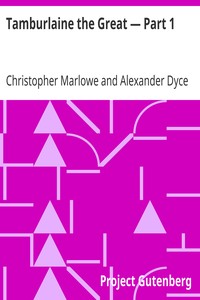Tamburlaine the Great — Part 1 by Christopher Marlowe
"Tamburlaine the Great — Part 1" by Christopher Marlowe is a play written in 1587 or 1588. This groundbreaking Elizabethan drama follows a Scythian shepherd who rises through cunning and conquest to become emperor of Persia. Tamburlaine defeats Persian rulers, captures the Turkish emperor and uses him as a footstool, then conquers Africa before claiming Damascus. The play revolutionized English drama with its vivid language and blank verse, demonstrating unprecedented theatrical power
and ambition that would influence playwrights for decades. (This is an automatically generated summary.)
Read or download for free
| How to read | Url | Size | |||
|---|---|---|---|---|---|
| Read now! | https://www.gutenberg.org/ebooks/1094.html.images | 260 kB | |||
| EPUB3 (E-readers incl. Send-to-Kindle) | https://www.gutenberg.org/ebooks/1094.epub3.images | 159 kB | |||
| EPUB (older E-readers) | https://www.gutenberg.org/ebooks/1094.epub.images | 165 kB | |||
| EPUB (no images, older E-readers) | https://www.gutenberg.org/ebooks/1094.epub.noimages | 140 kB | |||
| Kindle | https://www.gutenberg.org/ebooks/1094.kf8.images | 350 kB | |||
| older Kindles | https://www.gutenberg.org/ebooks/1094.kindle.images | 362 kB | |||
| Plain Text UTF-8 | https://www.gutenberg.org/ebooks/1094.txt.utf-8 | 180 kB | |||
| Download HTML (zip) | https://www.gutenberg.org/cache/epub/1094/pg1094-h.zip | 157 kB | |||
| There may be more files related to this item. | |||||
Similar Books
About this eBook
| Author | Marlowe, Christopher, 1564-1593 |
|---|---|
| Editor | Dyce, Alexander, 1798-1869 |
| Title | Tamburlaine the Great — Part 1 |
| Note | Wikipedia page about this book: en.wikipedia.org/wiki/Tamburlaine |
| Credits | Produced by Gary R. Young, and David Widger |
| Reading Level | Reading ease score: 80.4 (6th grade). Easy to read. |
| Language | English |
| LoC Class | PR: Language and Literatures: English literature |
| Subject | Timur, 1336-1405 -- Drama |
| Subject | English drama |
| Subject | Tragedies (Drama) |
| Subject | Historical drama |
| Category | Text |
| EBook-No. | 1094 |
| Release Date | Nov 1, 1997 |
| Most Recently Updated | Jan 18, 2013 |
| Copyright Status | Public domain in the USA. |
| Downloads | 2061 downloads in the last 30 days. |
| Project Gutenberg eBooks are always free! | |

